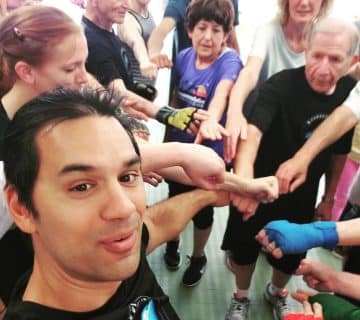After being diagnosed with Parkinson’s disease in her early 30s, Jennifer Parkinson embraced kickboxing as a way to tame her symptoms. Now, she’s helping others fight PD through her nonprofit organization, Neuroboxing.
Jennifer Parkinson was diagnosed with early-onset Parkinson’s in 2005 at the age of 32 and told she’d be confined to a wheelchair and unable to care for her children within a few years. Unwilling to take this news lying down, Parkinson had read about the benefits of non-contact boxing for PD and decided to step into the ring.
Less than 10 years later, she was a certified Rock Steady Boxing coach gearing up to open Title Boxing Club’s PD Fighters Program in Newbury Park, California, with business partners Josh Ripley and Lisa Oliver. The program quickly grew from 15 members in 2014 to nearly 100 in 2016.
Pleased with the success of Title Boxing Club, Parkinson and Ripley decided to branch off to start a new nonprofit, Neuroboxing, so they could serve a broader clientele that would not only include those with Parkinson’s, but also people living with multiple sclerosis or recovering from a stroke or traumatic brain injury. Today, Neuroboxing has eight locations throughout California with plans to expand to additional states.
Fitness techniques backed by research
One of the reasons behind Neuroboxing’s success is that its fitness program is guided by Parkinson’s research and the types of exercises that have been shown to potentially mitigate some of the common symptoms. “High intensity is a core component of every class we teach,” Parkinson said.
Variety is another. “Our classes are always a little different. We incorporate stretching, balance work, cognitive work and activities that challenge fine motor skills, so we’re working on things like grasp, handwriting and voice projection. They’re not the same exact format every time, which has been great for our members. They love and need that variety,” she said.
It helps that Neuroboxing’s fitness trainers have unique teaching styles. “Some do a circuit-style bootcamp workout, others do high-intensity interval training, and others focus on range of motion and big, exaggerated movements. Some get down on the floor and do core work,” Parkinson said.
“We also have a Neurospin cycling class two days a week that is a half-hour, Tabata-style class with lots of intervals where they’ll cycle really fast, then slow down for a few seconds before they speed back up again. In the beginning, the biggest issue was getting our members on and off the bikes. Now they are getting on and off the bikes on their own, and they have better balance. Our oldest client takes our Neurospin class, and he’s 93!”
Ensure no member is left behind
In order to serve a broad range of clients, Neuroboxing offers modified workouts that incorporate props such as chairs and walking poles for members who are in the more advanced stages of PD.
Parkinson and Ripley also make sure that there are at multiple trainers available to provide individual attention as necessary.
“Modifications, multiple instructors and individual attention are so important,” Parkinson emphasized. “You don’t want to be one trainer with 25 clients and wind up spending most of your time with one or two people and not giving the rest of the class the attention that they need.
“We have a great gym with this huge classroom space, then right next door is the boxing gym that has all the hanging bags. We start out with everybody together, then we break down into two separate groups, which allows us to have more time to work with the smaller groups,” she continued.
“One of the trainers will stay with one group and do functional training, like floor exercises or weights. Then the other group will do boxing circuit, then we’ll switch. Even though our class sizes do get big, we’re able to have those smaller breakout groups where we can give more individual attention.”
Have a passion for helping others
Parkinson has experience working in both nonprofit and for-profit PD fitness organizations, and in her opinion, a nonprofit model better suits Neuroboxing’s mission to help as many people as possible regardless if they can afford the monthly membership fees. “We don’t turn anybody away,” she said.
“It helps that this is a passion of mine. This isn’t something that I’m making money off. For me, the more support we can get from grants, the less members have to pay. Ultimately, our goal is to become fully funded, where we can offer Neuroboxing to everybody and not have to worry about anyone paying to work out with us,” Parkinson said.
“My advice for someone who wants to get involved in the Parkinson’s fitness community is that money should not be your primary goal. Your primary goal and driving motivation should be to help people with Parkinson’s. The next step is to volunteer and get some experience working with people with PD so that you understand the challenges they’re facing. Then, get the proper training in order to work with people in this population.”



